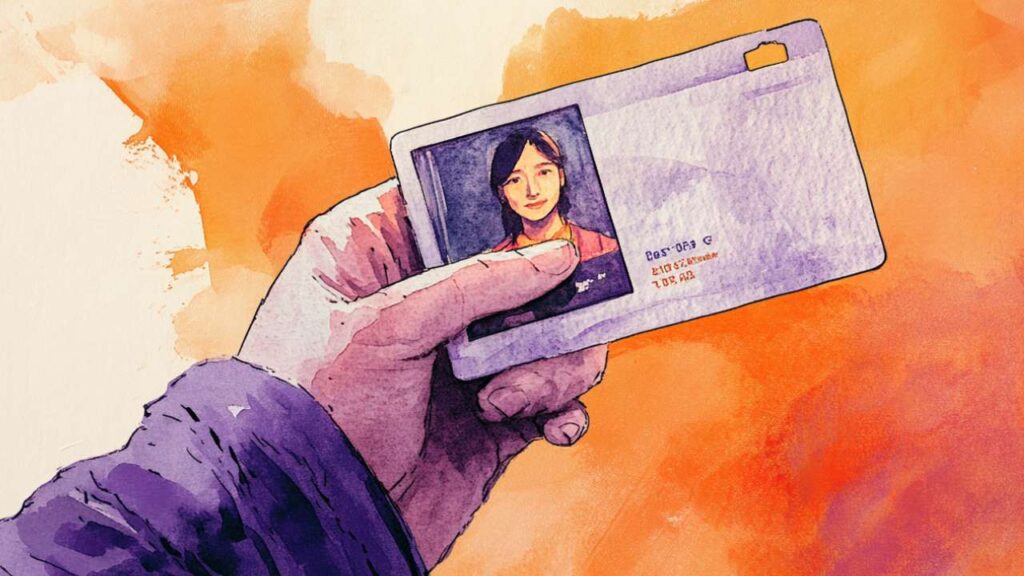Salima wishes to subscribe to an offer proposed by her region’s transport company and submits a file where identity photographs are requested. She wants to know if she has the right to provide a photograph with her headscarf. She also wonders about the same issue for her enrollment in a higher education institution, particularly for the creation of her student card.
What does the law say?
The requirement to provide a bare-headed identity photograph is subject to the existence of a legal text that expressly states this obligation.
Generally, we distinguish between two types of photographs:
1. Official identity photos that require appearing bare-headed:
- National identity card
- Passport
- Residence permit
- Health insurance card
- Driver’s license
2. Identity photos on unofficial documents that are not governed by any specific provision requiring appearing bare-headed:
- University or college enrollment file
- Student card
- Transport pass
- Sports membership card
- Any other card
Consequently, the principle is that wearing a headscarf should not pose any problem for the creation of one of these cards. Any refusal based on the grounds that you wish to use a photo where you are wearing a headscarf is therefore illegal and discriminatory.
Any regulation prohibiting the wearing of signs or attire manifesting a religious affiliation is illegal in any higher education institution, as it does not fall within the scope of the law of March 15, 2004. The illegality of such a regulation automatically gives it a discriminatory character as it breaks the equality of individuals in accessing the provided education and violates a fundamental freedom – guaranteed by the Constitution – which is freedom of conscience.
Indeed, according to Article 225-1 paragraph 1 of the Penal Code: “Discrimination constitutes any distinction made between natural persons on the basis of their origin, (…), their belonging or non-belonging, real or supposed, to an ethnicity, a nation, a race or a determined religion”.
Similarly, according to Article 225-2 of the Penal Code, “Discrimination defined in Article 225-1, committed against a natural person, is punishable by three years’ imprisonment and a fine of 45,000 euros when it consists of (1°) refusing the provision of a good or service and (4°) making the provision of a good or service subject to a condition based on one of the elements referred to in Article 225-1”.
The Defender of Rights has also ruled in this direction (Decision 2020-134 of October 2, 2020 regarding the obligation to present a “bare-headed” photo to obtain a public transport pass and thus travel in the concerned region):
The Defender of Rights recalls that, even if neutral, the requirement in question is likely to have a discriminatory impact on people wearing headgear for religious reasons, particularly Muslim women wearing a headscarf. He notes that French administrative courts have rejected on the merits appeals related to the obligation to pose ‘bare-headed’ in consideration of security conditions regarding photographs for official documents that also serve as identity documents (identity cards, passports). However, appeals contesting the obligation to pose ‘bare-headed’ have been successful when such an obligation had not been provided for by legislative or regulatory provisions and/or when it had been taken by an authority that was not competent. The Defender of Rights concludes that the obligation to remove one’s headscarf to obtain a transport pass, in compliance with illegal general terms of sale, characterizes a discriminatory practice based on religion contrary to Article 2-3 of the law of May 27, 2008.
What should I do?
If, despite everything, a remark is addressed to you about your headscarf in the photo outside of official identity documents:
- Consult the internal regulations of the organization in question, or the general terms of sale to become aware of the conditions relating to possible restrictions.
- If no provision is made in the internal regulations or in the general terms of sale, you can report this discrimination to your interlocutor and inform the hierarchical superior.
- If a provision is included in the internal regulations or in the general terms and conditions of sale, the measure is still illegal and should be contested.
- File an appeal with the relevant service or administration.
- If your appeal is rejected, you can refer the matter to the Defender of Rights: Contact the Defender of Rights
- Contact Equitas who will provide legal assistance and support you in your efforts.
Applicable references:
- Official identity photographs: Decree No. 99-973 of November 25, 1999 amending Decree No. 55-1397 of November 22, 1955 instituting the national identity card; Decree No. 2005-1726 of December 30, 2005 relating to passports; Order of April 10, 2007 relating to the affixing of identity photographs on identity and travel documents, driving licenses and residence permits; Decree No. 2007-199 of February 14, 2007 relating to the health insurance card and amending the Social Security Code.
- Issuance of student card: Art. D612-5 of the Education Code;
- Transportation ticket: Decision of the Defender of Rights No. 2020-134
- Religious freedom: Art. 10 of the Declaration of the Rights of Man and of the Citizen of 1789; Art. 9 of the European Convention for the Protection of Human Rights; Art. L. 141-6 and L. 811-1 of the Education Code; Art. 1, 3, 4, and 5 of the 1960 Convention against Discrimination in Education.




